| Pages:
1
..
7
8
9
10 |
specialactivitieSK
Hazard to Self
 
Posts: 94
Registered: 21-10-2014
Member Is Offline
Mood: No Mood
|
|
Another way :
Ng, DeGDN, Balistite Powder maked without solvent : pressing by rolling by temperature 80-95°C for Ng and 70-80°C for DeGDN Powder.. Cutting the
Powder by temperature 50°C. Somethime 2-8% solvent (Acetone).
|
|
|
specialactivitieSK
Hazard to Self
 
Posts: 94
Registered: 21-10-2014
Member Is Offline
Mood: No Mood
|
|
Something about size
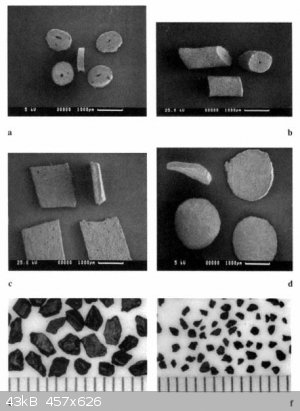
|
|
|
Bert
Super Administrator
        
Posts: 2821
Registered: 12-3-2004
Member Is Offline
Mood: " I think we are all going to die. I think that love is an illusion. We are flawed, my darling".
|
|
Sorry, can't quite read sizes in that image... Maybe add that info?
------
Attached pdf is largely about forensics related to NC used in propellants & explosives, but note on page 207 the statement about solvents and
stirring during manufacturing processes permanently changing the NC molecules, resulting in a rather lower molecular weight NC.
Choice of solvent and degree of mechanical processing have more impact on the product than night be expected.
Attachment: 978-1-61209-821-0_ch4.pdf (1.3MB)
This file has been downloaded 747 times
Rapopart’s Rules for critical commentary:
1. Attempt to re-express your target’s position so clearly, vividly and fairly that your target says: “Thanks, I wish I’d thought of putting it
that way.”
2. List any points of agreement (especially if they are not matters of general or widespread agreement).
3. Mention anything you have learned from your target.
4. Only then are you permitted to say so much as a word of rebuttal or criticism.
Anatol Rapoport was a Russian-born American mathematical psychologist (1911-2007).
|
|
|
specialactivitieSK
Hazard to Self
 
Posts: 94
Registered: 21-10-2014
Member Is Offline
Mood: No Mood
|
|
DEGDN Rocket Propellant 25g 960fps
https://youtu.be/AmI_xQEtXzA
|
|
|
ManyInterests
National Hazard
   
Posts: 969
Registered: 19-5-2019
Member Is Offline
|
|
I've been reading this thread with great interest since I do plan on making my own powder. There's a lot of good information here and I'll need to
reread everything in the future.
But I have one question regarding NG, EGDN, and PGDN... in terms of stability when it comes to making, is EGDN better than NG or the other way around?
What about PGDN? I heard that it is safer than NG but is harder to make. Would it be useful for making a double base powder as well?
|
|
|
dettoo456
Hazard to Others
  
Posts: 261
Registered: 12-9-2021
Member Is Offline
|
|
I don’t currently have the exact numbers with me at the moment but in terms of sensitivity and synthesis EGDN edges out NG in that it’s safer to
produce and initiate when you want it to but is much more volatile and degrades with the presence of impurities more readily in storage if I remember
correctly. OB% is also slightly higher with NG too which really matters for propellants when taking burn rate catalysts and stabilizer OB%’s into
effect.
So NG is better than EGDN for performance but worse than EGDN for safety reasons; pick your battles with that one.
PGDN’s synthesis is similar to other nitrate esters and although I don’t have the numbers right now, I’m pretty sure its mechanical
sensitivities are at least lower than EGDN (and by proxy lower than NG) from the addition of an extra CH3 group. OB% is of course lower as well in
PGDN.
https://ipo.lukasiewicz.gov.pl/wydawnictwa/wp-content/upload... ^ Some useful info PGDN’s vapor and storage behavior.
“Nitrate Esters Chemistry and Technology” is a good book for finding info on nitrate esters and their properties although some info gets lost in
translation from mandarin.
The “big players” (if you will) like BTTN and TMETN will always outshine the simple esters and if you have some spare malic acid and Pt
hydrogenation catalysts, or propionaldehyde and formaldehyde then you can try with them but other than that the classic NG is proven and capable for
most propellants applications so I’d recommend it over EGDN or PGDN.
|
|
|
specialactivitieSK
Hazard to Self
 
Posts: 94
Registered: 21-10-2014
Member Is Offline
Mood: No Mood
|
|
Maybe very slow evaporation is the way
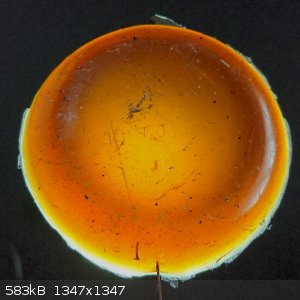
|
|
|
Bert
Super Administrator
        
Posts: 2821
Registered: 12-3-2004
Member Is Offline
Mood: " I think we are all going to die. I think that love is an illusion. We are flawed, my darling".
|
|
Sorry, way to do what?
Rapopart’s Rules for critical commentary:
1. Attempt to re-express your target’s position so clearly, vividly and fairly that your target says: “Thanks, I wish I’d thought of putting it
that way.”
2. List any points of agreement (especially if they are not matters of general or widespread agreement).
3. Mention anything you have learned from your target.
4. Only then are you permitted to say so much as a word of rebuttal or criticism.
Anatol Rapoport was a Russian-born American mathematical psychologist (1911-2007).
|
|
|
specialactivitieSK
Hazard to Self
 
Posts: 94
Registered: 21-10-2014
Member Is Offline
Mood: No Mood
|
|
To making material without bubbles.
|
|
|
ManyInterests
National Hazard
   
Posts: 969
Registered: 19-5-2019
Member Is Offline
|
|
Quote: Originally posted by dettoo456  | I don’t currently have the exact numbers with me at the moment but in terms of sensitivity and synthesis EGDN edges out NG in that it’s safer to
produce and initiate when you want it to but is much more volatile and degrades with the presence of impurities more readily in storage if I remember
correctly. OB% is also slightly higher with NG too which really matters for propellants when taking burn rate catalysts and stabilizer OB%’s into
effect.
So NG is better than EGDN for performance but worse than EGDN for safety reasons; pick your battles with that one.
PGDN’s synthesis is similar to other nitrate esters and although I don’t have the numbers right now, I’m pretty sure its mechanical
sensitivities are at least lower than EGDN (and by proxy lower than NG) from the addition of an extra CH3 group. OB% is of course lower as well in
PGDN.
https://ipo.lukasiewicz.gov.pl/wydawnictwa/wp-content/upload... ^ Some useful info PGDN’s vapor and storage behavior.
“Nitrate Esters Chemistry and Technology” is a good book for finding info on nitrate esters and their properties although some info gets lost in
translation from mandarin.
The “big players” (if you will) like BTTN and TMETN will always outshine the simple esters and if you have some spare malic acid and Pt
hydrogenation catalysts, or propionaldehyde and formaldehyde then you can try with them but other than that the classic NG is proven and capable for
most propellants applications so I’d recommend it over EGDN or PGDN. |
I forgot to thank you for that answer. Yes I have learned about the volatility of EGDN and PGDN (PGDN is slightly less volatile than EGDN) but NG's
volatility is non-existent.
BTW, what exactly is BTTN and TMETN? What are the reagents involved? Anything different in their synthesis from EGDN, NG, or PGDN?
|
|
|
Bert
Super Administrator
        
Posts: 2821
Registered: 12-3-2004
Member Is Offline
Mood: " I think we are all going to die. I think that love is an illusion. We are flawed, my darling".
|
|
Quote: Originally posted by ManyInterests  | | Yes I have learned about the volatility of EGDN and PGDN (PGDN is slightly less volatile than EGDN) but NG's volatility is non-existent.
|
From personal experience, NG volatility may be considered TRIVIAL in regards to all going away under decent storage conditions- But several splitting
headaches I've experienced say it does exist.
The couple of tries I made at classic low freezing dynamite mixtures long, long ago with the method of nitrating mixed glycerin + EGDN gave me a
formidable headache very quickly during the final processing with dry ingredients, I'm quite sure it was vapors rather than skin contact, I wore
gloves and was careful- At least it went away faster than an NG headache too.
BTTN and TMETN?
BTTN = 1,2,4-Butanetriol Trinitrate

TMTEN = Nitropentaglycerin; 1,1,1-trimethylolethane trinitrate

[Edited on 9-2-2022 by Bert]
[Edited on 9-2-2022 by Bert]
Rapopart’s Rules for critical commentary:
1. Attempt to re-express your target’s position so clearly, vividly and fairly that your target says: “Thanks, I wish I’d thought of putting it
that way.”
2. List any points of agreement (especially if they are not matters of general or widespread agreement).
3. Mention anything you have learned from your target.
4. Only then are you permitted to say so much as a word of rebuttal or criticism.
Anatol Rapoport was a Russian-born American mathematical psychologist (1911-2007).
|
|
|
ManyInterests
National Hazard
   
Posts: 969
Registered: 19-5-2019
Member Is Offline
|
|
Those look really good. If they can be more stable and higher performing than NG, I might be interested in experimented in making some. Though I don't
know any sources of Butanetriol.
Triethylene glycol is another chemical that can be used to make a liquid explosive and can substitute NG. Any sources of that? It isn't Ethylene
Glycol for sure (and I have a liter of that).
|
|
|
specialactivitieSK
Hazard to Self
 
Posts: 94
Registered: 21-10-2014
Member Is Offline
Mood: No Mood
|
|
Second attempt at slow evaporation. I need to find suitable kitchen utensils with a completely flat bottom.
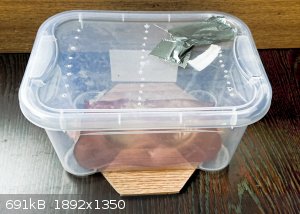 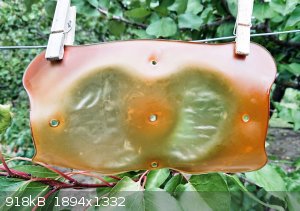
|
|
|
ManyInterests
National Hazard
   
Posts: 969
Registered: 19-5-2019
Member Is Offline
|
|
I would like to do that, on my list of projects in the future is making my own primer compounds and propellants. I will need to do extensive research
for these before doing it since this is not something I can find videos for me to use as visual guides.
|
|
|
Herr Haber
International Hazard
    
Posts: 1236
Registered: 29-1-2016
Member Is Offline
Mood: No Mood
|
|
If you are talking chemical stability then just overdo the washings.
Wasnt a bottle made by Ascanio Sobrero himself regularly tested for decades or a century showing no degradation ?
If you want more usability, a few strands of NC will make a gel. There, you might consider another source of possible degradation assuming home made
NC will always contain tiny amounts of acid.
The other thing is: you're trying to get a bigger bang. NG, EGDN are pretty easy to set off. Before the mercury fulminate detonators black powder was
used. Urbanski books basically teach you that the better the initiation, more complete is the reaction (More CO2, less CO essentially better vod
etc.).
So a good number 8 is better than a firecracker even if they both work.
Not only that, but even for something easy to initiate (NG) you still need confinement and diameter. Urbanski has charts with pipes of different
materials, diameters, wall thickness.
Pretty interesting stuff as is all his material.
His section on the manufacture of all the different types of double and triple based propellants is quite extensive. But what to expect from someone
who writes about cellulose alone for 60 pages 
The spirit of adventure was upon me. Having nitric acid and copper, I had only to learn what the words 'act upon' meant. - Ira Remsen
|
|
|
ManyInterests
National Hazard
   
Posts: 969
Registered: 19-5-2019
Member Is Offline
|
|
Quote: Originally posted by Herr Haber  |
If you are talking chemical stability then just overdo the washings.
Wasnt a bottle made by Ascanio Sobrero himself regularly tested for decades or a century showing no degradation ?
If you want more usability, a few strands of NC will make a gel. There, you might consider another source of possible degradation assuming home made
NC will always contain tiny amounts of acid.
The other thing is: you're trying to get a bigger bang. NG, EGDN are pretty easy to set off. Before the mercury fulminate detonators black powder was
used. Urbanski books basically teach you that the better the initiation, more complete is the reaction (More CO2, less CO essentially better vod
etc.).
So a good number 8 is better than a firecracker even if they both work.
Not only that, but even for something easy to initiate (NG) you still need confinement and diameter. Urbanski has charts with pipes of different
materials, diameters, wall thickness.
Pretty interesting stuff as is all his material.
His section on the manufacture of all the different types of double and triple based propellants is quite extensive. But what to expect from someone
who writes about cellulose alone for 60 pages  |
Sorry, when I mean stability sometimes I am referring to sensitivity. NG is really sensitive stuff and I would rather work with similarly powerful but
less sensitive stuff. There's a reason why I spent so much time trying to make NHN and CHP to use as primaries.
Also remember on the PDGN thread you mentioned an author called Conklin? I couldn't find his book, and I would also like to see Urbanski's book. If
you got links to where I can download them I would be eternally grateful. 
Especially if he has such extensive instructions on making double-base and single-base powders. I do want to make those for rifle, shotgun, and
handgun rounds. I would love to go to the range and fire off a 100 rounds or so of ammo using homemade propellant and primers, that would be epic!
Edit: https://archive.org/details/Chemistry_and_Technology_of_Expl...
Is this the Urbanski you're talking about? He has a whole series which I will download all!
https://www.amazon.com/Chemistry-Pyrotechnics-Principles-The...
and is this the book about Conklin you were talking about? Ones that has the priming compounds?
[Edited on 2-11-2022 by ManyInterests]
|
|
|
Bert
Super Administrator
        
Posts: 2821
Registered: 12-3-2004
Member Is Offline
Mood: " I think we are all going to die. I think that love is an illusion. We are flawed, my darling".
|
|
Conkling = Dr. John A. Conckling. Google will show you his several publications.
Dr. Conkling died last year, unfortunately.
https://www.legacy.com/us/obituaries/baltimoresun/name/john-...
I also would recommend "Pyrotechnics" by Dr. Alexander Hardt.
https://www.amazon.com/Pyrotechnics-Alexander-Hardt/dp/09293...
[Edited on 11-2-2022 by Bert]
Rapopart’s Rules for critical commentary:
1. Attempt to re-express your target’s position so clearly, vividly and fairly that your target says: “Thanks, I wish I’d thought of putting it
that way.”
2. List any points of agreement (especially if they are not matters of general or widespread agreement).
3. Mention anything you have learned from your target.
4. Only then are you permitted to say so much as a word of rebuttal or criticism.
Anatol Rapoport was a Russian-born American mathematical psychologist (1911-2007).
|
|
|
Herr Haber
International Hazard
    
Posts: 1236
Registered: 29-1-2016
Member Is Offline
Mood: No Mood
|
|
Quote: Originally posted by ManyInterests  |
I would also like to see Urbanski's book. If you got links to where I can download them I would be eternally grateful. 
[Edited on 2-11-2022 by ManyInterests] |
I pointed you a couple of times to the SM Library but...
Where are his books gone ?!
http://library.sciencemadness.org/library/index.html
Davis is still there. Where's Shimizu gone ?
The spirit of adventure was upon me. Having nitric acid and copper, I had only to learn what the words 'act upon' meant. - Ira Remsen
|
|
|
dettoo456
Hazard to Others
  
Posts: 261
Registered: 12-9-2021
Member Is Offline
|
|
@ManyInterests Butanetriol can be formed via reduction of Malic Acid w/ Pd/C although any reducing agent capable of carboxylic acid reduction should
do.
https://link.springer.com/content/pdf/10.1007/s10562-021-038...
https://zero.sci-hub.se/6469/c7aee14b783dd92a5ece2a658f608b7...
|
|
|
ManyInterests
National Hazard
   
Posts: 969
Registered: 19-5-2019
Member Is Offline
|
|
Thanks. I will look into those. I think I will be going the route of using diethylene glycol since I found that sold commonly (and cheaply) as liquid
camp fuel in many camping stores. The brand that I got, Coghlan's, states in its MSDS that it is 99-100% diethylene glycol and a 0-1% ethylene glycol.
the ethylene glycol contamination is absolutely minimal and won't effect the power I want to try to make with it.
I also read in Urbanski that DEGDN is less volatile than nitrogylcerin while also being substantially less sensitive. These characteristics I find
extremely appealing, especially the reduced sensitivity (this making it safer to handle). The only downside is that it is quite hygroscopic and I need
to take care to make sure it is free of water and remains so.
It'll be a while before I get to making propellants the primers, but I got everything I need to make them.
|
|
|
Laboratory of Liptakov
International Hazard
    
Posts: 1447
Registered: 2-9-2014
Location: Tel Aviv University
Member Is Offline
Mood: old jew
|
|
https://www.amazon.com/Coghlans-Camp-Heat-2-Pack/dp/B000FY21... .....
Fuel really contains diethylene glycol. Great message. Thanks. DEG is super fuel for NaClO4. Details:
http://www.sciencemadness.org/talk/viewthread.php?tid=4076
Demonstration of efficiency here from 0:45
https://www.youtube.com/watch?v=0CTB9k1l15A
Development of primarily - secondary substances: CHP (2015) neutral CHP and Lithex (2022) Brightelite (2023) Nitrocelite and KC primer (2024) Diper
60 (2025)
|
|
|
ManyInterests
National Hazard
   
Posts: 969
Registered: 19-5-2019
Member Is Offline
|
|
Yes that is the same product I ordered. Here is the SDS from the manufacturer:
https://www.coghlans.com/content/files/Coghlans/SDS%20Sheets...
In section 3 on composition it stated 99-100 DEG. Mean it cannot contain any more than 1% EG, but there is a good chance that it contains even less,
meaning it is effectively the purest DEG you can get without any processing.
[Edited on 3-1-2023 by ManyInterests]
|
|
|
Bert
Super Administrator
        
Posts: 2821
Registered: 12-3-2004
Member Is Offline
Mood: " I think we are all going to die. I think that love is an illusion. We are flawed, my darling".
|
|
Orange???
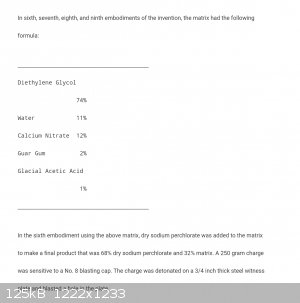
Rapopart’s Rules for critical commentary:
1. Attempt to re-express your target’s position so clearly, vividly and fairly that your target says: “Thanks, I wish I’d thought of putting it
that way.”
2. List any points of agreement (especially if they are not matters of general or widespread agreement).
3. Mention anything you have learned from your target.
4. Only then are you permitted to say so much as a word of rebuttal or criticism.
Anatol Rapoport was a Russian-born American mathematical psychologist (1911-2007).
|
|
|
Laboratory of Liptakov
International Hazard
    
Posts: 1447
Registered: 2-9-2014
Location: Tel Aviv University
Member Is Offline
Mood: old jew
|
|
For security reasons (YouTube) the exact composition was not stated. Another thing is that the composition can be quite variable. As stated in the
patent.
Exact tested compose: NaClO4 ....(OB + 52.3) .....74 parts
DEG.......( OB - 150.8)............................................26 parts
dH2O.......(OB zero).............................................. 10 parts ..... (variable 8 - 15)
water acrylate pigment (orange, OB -160 cca)......1 by part of weight.........(variable 0.0 - 2.... green, blue, red, yellow)
Guar gum...( OB-115 cca)......................................2 parts.....(variable 0.0 - 2)
Variable tested compounds: glass microballoons 2, sodium chlorate 3,
Uncompatabile with any Aluminium. Bubble H2.
Development of primarily - secondary substances: CHP (2015) neutral CHP and Lithex (2022) Brightelite (2023) Nitrocelite and KC primer (2024) Diper
60 (2025)
|
|
|
Bert
Super Administrator
        
Posts: 2821
Registered: 12-3-2004
Member Is Offline
Mood: " I think we are all going to die. I think that love is an illusion. We are flawed, my darling".
|
|
Quote: Originally posted by Laboratory of Liptakov  | For security reasons (YouTube) the exact composition was not stated. Another thing is that the composition can be quite variable. As stated in the
patent.
Exact tested compose: NaClO4 ....(OB + 52.3) .....74 parts
DEG.......( OB - 150.8)............................................26 parts
dH2O.......(OB zero).............................................. 10 parts ..... (variable 8 - 15)
water acrylate pigment (orange, OB -160 cca)......1 by part of weight.........(variable 0.0 - 2.... green, blue, red, yellow)
Guar gum...( OB-115 cca)......................................2 parts.....(variable 0.0 - 2)
Variable tested compounds: glass microballoons 2, sodium chlorate 3,
Uncompatabile with any Aluminium. Bubble H2.
|
No calcium nitrate dissolved in the water or glacial acetic acid (acetic acid is a cross linking catalyst for the guar gum?). I noticed the patent
claim I excerpted gave lower densities than your reported 1.7g/cc too.
Making otherwise off white compositions color coded with water soluble dyes could be a "thing"if you needed to test a number of compositions, help
keep them identifiable in handling.
I wonder about adding a water or diethylene glycol soluble decomposition catalyst for the perchlorate such as ferrocene?
Rapopart’s Rules for critical commentary:
1. Attempt to re-express your target’s position so clearly, vividly and fairly that your target says: “Thanks, I wish I’d thought of putting it
that way.”
2. List any points of agreement (especially if they are not matters of general or widespread agreement).
3. Mention anything you have learned from your target.
4. Only then are you permitted to say so much as a word of rebuttal or criticism.
Anatol Rapoport was a Russian-born American mathematical psychologist (1911-2007).
|
|
|
| Pages:
1
..
7
8
9
10 |